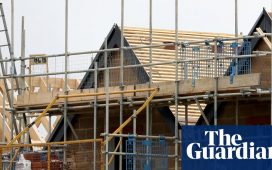Labour will miss its target of delivering 1.5m new homes this parliament without an emergency cash injection into the affordable housing sector, providers have warned.
Housing associations and councils have written to deputy prime minister, Angela Rayner, saying her promise to deliver “the biggest boost to affordable housing in a generation” will be impossible unless there are urgent interventions to fix the financial pressures providers face.
The warning comes as new figures, shared exclusively with the Guardian, show that housing associations, the biggest developers of social housing, started just 32,705 homes in 2023-24. This is down 30% on the 2022-23 figures.
The letter – signed by the National Housing Federation (NHF), which represents 600 housing associations, and the Local Government Association (LGA) – said that capped income, crippling cuts and soaring costs had decimated providers’ budgets, reducing the amount of homes they could build.
It said that rental income was now 15% lower in real terms compared with 2015, and this would contribute to councils facing a £2.2bn black hole in housing budgets by 2028.
“At the next spending review, we need a long-term plan for new and existing social homes, underpinned by a fair and sustainable financial model developed alongside councils and housing associations,” the letter said.
“Without this, we will not be able to deliver our shared ambition to build 1.5m new homes this parliament. New-build projects are already being delayed and cancelled across the country due to significant financial pressures and uncertainty.”
At the last party conference, Rayner, who is also now housing secretary, pledged that when in government Labour would deliver the biggest boost in affordable and social housing for a generation, while providing stability and certainty for the affordable and social housing market.
This was reiterated on Monday by the chancellor, Rachel Reeves, who said her new changes to planning rules would allow the country to build thousands of affordable homes.
But the number of affordable home starts fell by 22% to 30,631 over the 12 months to March 2024, according to the NHF’s latest supply survey. This includes just 7,179 homes for social rent, the most affordable tenure model, where tenants pay about half market rent value.
Paul Hackett, the chief executive of Southern Housing, a London-based housing association that owns 70,000 homes, said the provider had stopped buying new sites because cash from rents was currently not enough to cover its costs.
He added: “I’ve been working in housing now for 35 years, and there has never been a time when housing association capacity is so decimated.”
The development issues have stretched to the private sector. Barratt, the country’s largest private housebuilder, said on Wednesday that it expected the number of homes it completed this year to drop by 7%, blaming political and economic uncertainty.
In addition to the rent shortfall, local authorities, housing associations and councils are facing increased costs to keep their homes in good condition and safe.
after newsletter promotion
The letter says that housing associations will expect to pay more than £6bn on building safety costs following the Grenfell Tower fire.
They also forecast that £50,000, on average, will have to be spent on each social home over the next three decades to meet decarbonisation and decent homes requirements.
The LGA and NHF are also calling for the government to open up the building safety fund, which pays for the removal of dangerous cladding, to social housing providers. They are also demanding emergency funding to be added to the government’s current £11.5bn affordable homes programme.
A Ministry of Housing, Communities and Local Government spokesperson said: “We are committed to delivering 1.5m new homes by the end of this parliament, with the biggest increase in social housing and affordable housebuilding in a generation.
“This government will also work in partnership with councils, housing associations and the wider sector to ensure we hit our ambitious target and build the homes Britain needs.”
The letter was also signed by the Chartered Institute of Housing, the National Federation of ALMOs and the Association of Retained Council Housing.










